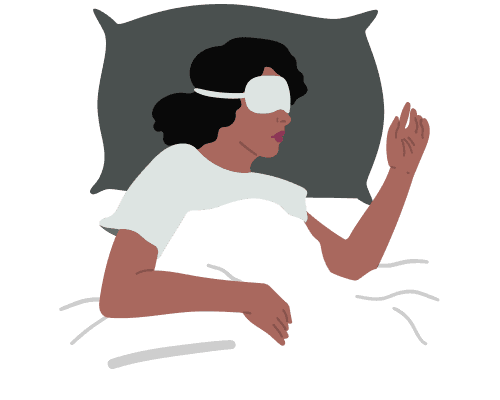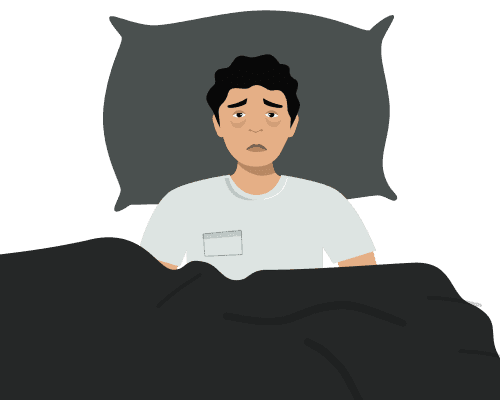
Wondering if your sleep hygiene and routine are affecting your health?
Many people who suffer from sleep disorders are unaware of their condition. Sleep problems are classified into several forms. They might include trouble falling asleep, remaining asleep, or even getting enough sleep.
Consider taking our sleep quiz if you believe you may have a sleep problem or condition. It can help you assess the quality of your sleep and decide if you have a sleep disorder.
Instructions: Simply answer the questions on how you have felt during the past 6 months. Take your time and answer truthfully for the most accurate results.
This online screening is not a diagnostic tool. Only a healthcare expert or sleep specialist can provide an appropriate diagnosis and, if necessary, a treatment plan.
Healthy Sleep Habits
Sleep is crucial for a multitude of reasons, and it is a cure for practically all of the scourges of the twenty-first century.
Sleeping restores your body's energy suppresses hunger and cravings, relieves stress, regulates mood and emotions, improves memory, and improves physical and mental well-being, among other benefits. Sleep aids in the recovery of practically any ailment, from a minor cold to a broken heart.
However, what should you do if you are unable to sleep?
Spoiler alert: You'll have to relearn how to fall asleep rapidly from the ground up.
Here are some tips on how to improve sleep habits:
Here are some tips on how to improve sleep habits:
The quality of your rest and recovery is influenced by your sleeping habits. Poor sleep hygiene, on the other hand, leads to a variety of physical and mental health problems, such as depression, insomnia, obesity, and a slew of other unpleasant ways to ruin your life.
The quality of your rest and recovery is influenced by your sleeping habits. Poor sleep hygiene, on the other hand, leads to a variety of physical and mental health problems, such as depression, insomnia, obesity, and a slew of other unpleasant ways to ruin your life.
Pay attention to your sleeping pattern and rituals before going to bed to get the most out of your sleep.
Set a consistent sleeping routine first and foremost. For at least 21 days, go to bed and wake up at around the same hour; eventually, it will become a habit.
After that, make sure you don't disrupt your sleeping patterns. During a phase, an average sleeping cycle lasts 1.5 hours and transitions from a lighter to deeper sleep. If you wake up in the middle of a cycle, you feel tired, perplexed, and ground down. As a result, you need to sleep for 6 to 7,5 hours in order to wake up energized. If you only have a few hours to sleep, avoid disturbing the deep period of your sleep cycle. To complete the cycle and feel better, catnap for 1.5 to 3 hours.
Your activities 1-2 hours before you go to bed are the methods to fall asleep quickly or develop a sleep disorder.
Your activities 1-2 hours before you go to bed are the methods to fall asleep quickly or develop a sleep disorder.
If you want to sleep sweetly and soundly, you must abandon a damaging pre-bed ritual in favor of a healthier option that best suits your needs.
To begin, here is a list of items you should avoid before going to bed: screen time, coffee, a high-sugar dinner, and crowded, noisy surroundings.
First, don't overburden your brain with additional information to digest before bed. Variegated videos, texts, and images put additional strain on your sensors, making it difficult for them to relax and prepare for recuperation. To relax your brain and prepare it to turn off, stop scrolling through social media, reading the news, and watching TV shows.
Next, don't stuff your stomach with too much food; eating protein-rich foods with fiber approximately 3 hours before bedtime is ideal. Also, save coffee, tea, fruits, and sweet treats for breakfast; these items are fantastic for waking up but not for relaxing before bed. Consider herbal tea if you're in need of a hot beverage.
Finally, make sure you feel safe and relaxed in the room you are going to sleep in.
Meditation and journaling will help you set your thoughts to order.
Take a walk outside or do 15-minute relaxing yoga to release the tension from your body.
Take a shower to wash all the worries of the passing day away and do some skincare to moisturize your body (and avoid discomfort during sleep).
Spend some quality time with your loved ones to enhance your emotional stability and feeling of happiness.
Here you go - ready to sleep and recover for a new productive day!
Create a comfortable sleeping place.
Make sure your place to sleep is comfortable: check the room temperature, light, and sounds.
Make sure your place to sleep is comfortable: check the room temperature, light, and sounds.
Place. Your bed is a place for sleeping and having sex, not for multitasking. It's quite comfortable to stay in your PJs all day, work from home snuggled in your blanket and pillows, and have your coffee, snacks, and TV shows right in your bed - but this 'work from bed' practice is likely to impair both your productivity and your sleep.
So, if you want to get a good night's sleep, do whatever you want - but not in bed. Only use it for sleeping.
Furthermore, if you swivel restlessly and cannot fall asleep for an extended period, get up and leave your bedroom until you are ready to sleep.
Sounds. Make sure your sleeping quarters are peaceful, quiet, and private. Loud and sudden noises, font discussions, and television all convey danger to your nervous system, making it difficult to relax.
If you live in a major city with constant noise, noisy neighbors, or a snoring companion, consider investing in a pair of earplugs to drown out the sounds. For a better effect, listen to meditation music while sleeping.
Temperature. Sleep in a cool, well-ventilated environment between 64- and 66 degrees Fahrenheit. In a cool environment, the deep sleep phase occurs faster and lasts longer, so you will sleep better and fall asleep faster.
Light. Keep a contrast of lighting in your active and resting time by staying in well-lit rooms with plenty of sunlight during the day and in a dark room with thick curtains at night. Additionally, stay away from blue light (generally coming from device screens).
Last but not least, improved sleep patterns will considerably improve your health and general well-being. There are numerous methods for forcing yourself to learn a new habit. Allow psychology to assist you in answering the questions 'Where am I?' and 'What specifically do I need to work on?'
Last but not least, improved sleep patterns will considerably improve your health and general well-being. There are numerous methods for forcing yourself to learn a new habit. Allow psychology to assist you in answering the questions 'Where am I?' and 'What specifically do I need to work on?'
Pass the Sleep Habits quiz to eliminate your blind spots and begin improving your life.
Eat whatever you want with intermittent fasting!






